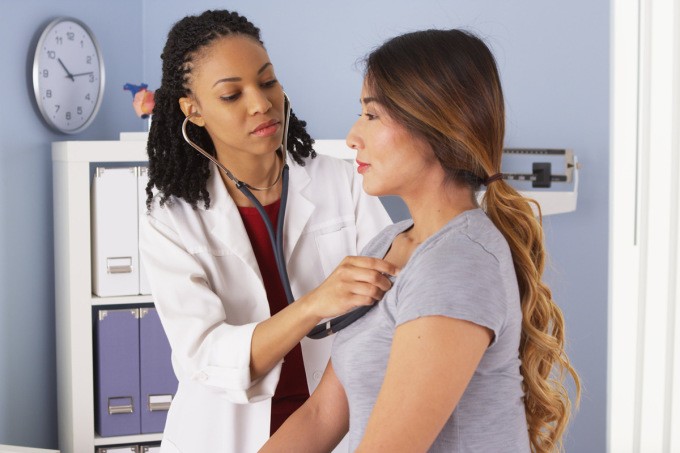5 health risks women should not ignore
Heart disease, cancer, osteoporosis, Alzheimer's and problems with motherhood are five health risks women need to pay special attention to.
'Women have many unique health concerns, including menstrual cycles, pregnancy, birth control, menopause. And that's just the beginning,' Harvard Health says. 'Some health issues affect women only, and others are more common in women. What's more, men and women can have the same condition, but have different symptoms. Many diseases affect women differently and may even require separate treatments.'
Here are five health risks women need to pay special attention to.
Advertisement

Advertisement
Photo: Hawaii Pacific Health
1. Heart disease
According to the World Heart Federation, cardiovascular disease is responsible for 35% of deaths in women each year - more than all cancers combined.
'Heart disease is the number one cause of death in both men and women,' said Dr. Hem Bhardwaj, a cardiologist and critical care specialist at VCU Health's Pauley Heart Center. However, women often have different and later symptoms than men, and have more complications.
Sometimes women experience symptoms such as weakness, fatigue, shortness of breath, and jaw pain, rather than the typical chest pain and jerking sensation in the arm that men experience. Hormonal changes in women after menopause may be a factor. For example, both men and women are often diagnosed with coronary artery disease, but women tend to develop it after menopause due to hormonal changes.
2. Cancer
Women should be screened for cancer regularly, depending on their age.
'An estimated two million people in the United States will be diagnosed with cancer by 2023,' says medical expert Amber Stephens via WellMed. 'It is the second leading cause of death for older women. The most common cancers for women over 65 are breast, lung, and colorectal cancer. Breast cancer is the most common cancer in women of all ages. Early detection of cancer can save your life, so see your doctor as soon as possible if you notice anything unusual.'
Stephens recommends that women get regular cancer screenings such as mammograms and colorectal cancer screenings, especially after age 65, and talk to your doctor about which tests are right for you.
'The best way to prevent cancer is to stop smoking. New research shows that drinking alcohol is also linked to cancer. Alcohol is linked to 6% of all cancers, including breast and colon cancer. This is true for all types of alcohol,' Stephens says.
3. Alzheimer's disease
Women are more likely than men to develop dementia, especially Alzheimer's disease. "Alzheimer's disease is a progressive brain disorder that affects memory, thinking, and behavior. While there can be a number of causes of dementia, the most common are related to vascular dementia (the same causes as heart disease and stroke) and Alzheimer's disease," Stephens says.
Alzheimer's is increasingly being called "Type 3 diabetes." Healthy lifestyles and timely medical care help prevent the disease. In the United States, nearly 4 million of the more than 6 million people with Alzheimer's are women. "Women in their 60s are twice as likely to develop Alzheimer's as they are to develop breast cancer. In fact, one in five women 65 and older have it," Stephens says.
4. Osteoporosis
Women are more likely to develop osteoporosis than men. "Did you know that 50% of women in the United States age 50 and older have suffered a fracture due to osteoporosis? Overall, about 54 million Americans have osteoporosis, which is thinning of the bones, or low bone density, which can lead to fractures. Women typically start with lower bone density than men, and loss of estrogen over time can increase the risk of osteoporosis," Kendall Ford Moseley, MD, told Johns Hopkins Health.
5. Health problems when becoming a mother
Many women experience iron-deficiency anemia and high blood pressure during pregnancy. 'Preconception care is important regardless of whether you have any medical conditions,' says Jessica W. Kiley, MD, an obstetrician-gynecologist at Northwestern Memorial Hospital. 'For example, people with diabetes or high blood pressure should control these conditions as best they can when they are planning to conceive. Some people do not want to take medication during pregnancy. Many conditions require medication and can be harmful to you if left untreated. This is an important conversation to have with your doctor.'

Saved post successfully
You can review saved articles on the Saved Articles page.
Agree
You should read it
- ★ After watching the series below, you will understand why the average life expectancy of men is lower than that of women
- ★ 8 signs of cervical cancer identification in women
- ★ Men who want to succeed stay away from these seven types of women
- ★ 6 warning signs of a heart attack in women should not be ignored
- ★ 10 secrets that every beautiful woman would never dare to admit